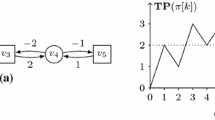Abstract
The computational complexity of a variety of problems from algorithmic game theory is investigated. These are variations on the question whether a strategy in a normal form game survives iterated elimination of dominated strategies. The difficulty of the computational task depends on the notion of dominance involved, on the number of distinct payoffs and whether the game is constant-sum. Most of the open cases are fully classified, and the remaining cases are shown to be equivalent to certain questions regarding elimination orders on graphs. The classifications may serve as the basis for a discussion to what extent iterated dominance could be useful to restrict rationality for computationally bounded agents.
Similar content being viewed by others
Notes
The claim of order invariance up to strategy permutation for weak dominance given in [13, Proposition 1] is wrong. A trivial counterexample is the game A=(0,1), B=(0,0) with the two reduced forms A ′=(0), B ′=(0) and A ″=(1) , B ″=(0).
Doing so for strictly dominated strategies does not influence the final result, while doing so for weakly dominated strategies could result in empty strategy sets.
Often the concept of never best responses is considered against mixed strategies instead. Then never best responses and strictly dominated strategies would coincide (compare e.g. [16, Pages 59–60]). Elimination of never best responses against pure strategies however is a distinct concept.
It is straightforward that these cases are equivalent. Technically, our examples will be constant-sum games rather than zero-sum games.
While P-completeness is claimed, the corresponding part of the proof is wrong. However, as we will show later, the P-completeness result is true.
In particular, an And vertex with in-degree 0 always has the value true; thus, we do not need to include designated True vertices. In theory, the same is true for False and Or vertices, however, including False vertices explicitly facilitates our constructions.
I would like to thank Anuj Dawar and Yuguo He for pointing out this result to me.
Or, if x is subsequently eliminated by another strategy z, by (z,y k ), and so on.
Note that approximate Nash equilibria are not necessarily approximations to Nash equilibria, but a far weaker criterion.
References
Apt, K.R.: Order independence and rationalizability. In: Theoretical Aspects of Rationality and Knowledge (TARK X) (2005). arXiv:cs/0509063
Beame, P., Cook, S., Edmonds, J., Impagliazzo, R., Pitassi, T.: The relative complexity of NP search problems. J. Comput. Syst. Sci. 57, 3–19 (1998)
Bernheim, B.D.: Rationalizable strategic behavior. Econometrica 52, 1007–1028 (1984)
Brandt, F., Brill, M., Fischer, F., Harrenstein, P.: On the complexity of iterated weak dominance in constant-sum games. Theory of Computing Systems 49 (1), 162–181 (2011). doi:10.1007/s00224-010-9282-7
de Callataÿ, A.: Natural and Artificial Intelligence, 2nd edn. North-Holland (1992)
Chen, X., Deng, X.: Settling the complexity of 2-player Nash-equilibrium. Tech. Rep. 134, Electronic Colloquium on Computational Complexity (2005)
Conitzer, V., Sandholm, T.: Complexity of (iterated) dominance. In: EC ’05: Proceedings of the 6th ACM Conference on Electronic Commerce, pp 88–97. ACM, New York (2005), doi:10.1145/1064009.1064019
Daskalakis, C., Goldberg, P., Papadimitriou, C.: The complexity of computing a Nash equilibrium. SIAM J. Comput. 39(1), 195–259 (2009)
Downey, R., Fellows, M.: Parameterized Complexity. Springer (1999)
Gilboa, I., Kalai, E., Zemel, E.: The complexity of eliminating dominated strategies. Math. Oper. Res. 18(3), 553–565 (1993) [ http://www.jstor.org/stable/ 3690089]
Gilli, M.: Iterated admissibility as solution concept in game theory. Department of Economics Working Paper 47, University of Milan-Bicocca (2002)
Kalai, E., Zemel, E.: On the order of eliminating dominated strategies. Discussion Papers 789, Northwestern University, Center for Mathematical Studies in Economics and Management Science (1988)
Knuth, D., Papadimitriou, C., Tsitsiklis, J.: A note on strategy elimination in bimatrix games. Oper. Res. Lett. 7(3), 103–107 (1988)
Marx, L.M., Swinkels, J.M.: Order independence for iterated weak dominance. Games and Economic Behavior 18(2), 219–245 (1997)
Marx, L.M., Swinkels, J.M.: Order independence for iterated weak dominance. Games and Economic Behavior 31(2), 324–329 (2000). Corrigendum
Osborne, M.J., Rubinstein, A.: A Course in Game Theory. MIT Press (1994)
Papadimitriou, C.H.: Computational Complexity. Addison Wesley (1994)
Papadimitriou, C.H.: The complexity of finding Nash equilibria. In: Nisan, N., Roughgarden, T., Tardos, É., Vazirani, V. (eds.) Algorithmic Game Theory, pp 29–52, Cambridge University Press (2007)
Pauly, A.: Computable Metamathematics and its Application to Game Theory. PhD Thesis, University of Cambridge (2012)
Pauly, A.: How incomputable is finding Nash equilibria?. Journal of Universal Computer Science 16(18), 2686–2710 (2010). doi:10.3217/jucs-016-18-2686
Pearce, D.: Rationalizable strategic behavior and the problem of perfection. Econometrica 52, 1029–1050 (1984)
Rubinstein, A.: Modeling Bounded Rationality. Zeuthen Lecture Book. Massachusetts Institut of Technology (1998)
Trost, M.: An epistemic rationale for order-independence. In: 10th Conference on Logic and the Foundations of Game and Decision Theory (2012)
Acknowledgements
I am grateful to Anuj Dawar for his support and advice as my PhD advisor. Furthermore, I would like to thank the anonymous referees of an earlier version for their detailed and helpful comments.
Author information
Authors and Affiliations
Corresponding author
Rights and permissions
About this article
Cite this article
Pauly, A. The Computational Complexity of Iterated Elimination of Dominated Strategies. Theory Comput Syst 59, 52–75 (2016). https://doi.org/10.1007/s00224-015-9637-1
Published:
Issue Date:
DOI: https://doi.org/10.1007/s00224-015-9637-1




